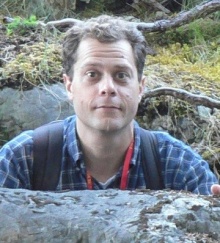Ecological consequences of phenological mismatches between pollinators and their floral resources

Diego Vazquez
Instituto Argentino de Investigaciones de las Zonas Áridas, CONICET - dvazquez@mendoza-conicet.gob.ar
Argentina Facultad de Ciencias Exactas y Naturales, UN Cuyo, Argentina
Freiburg Institute for Advanced Studies, University of Freiburg, Germany
(Seminar in English)
Periodic events in the life cycle of organisms (phenology) can vary in time and space in response to changes in their environment. Different species respond idiosyncratically to environmental variation, leading to phenologial mismatches among interacting species. I will discuss my ongoing research on the demographic consequences of phenological mismatches for solitary bees: how nesting too early or too late in the breeding season may mean fewer floral resources (food and nest-building materials) and eventually poorer reproduction. I will show evidence that the reproductive performance of specialist bees tends to be lower in years of stronger nesting-flowering mismatches. I will also assess how these demographic effects vary geographically. I will end with a discussion of the implications of these results for our understanding of the ecological consequences of climate change.
Recent publications:
Vázquez DP, Gianoli E, Morris WF, Bozinovic F. (2015) Ecological and evolutionary impacts of chaning climatic variability. Biological Reviews, in press
Vázquez DP, Ramos-Jiliberto R, Urbani P, Valdovinos FS (2015) A conceptual framework for studying the strength of plant-animal mutualistic interactions. Ecology Letters 18: 385-400
Dorado J, Vázquez DP (2014) The diversity-stability relationship in floral resources. Oikos 123: 1137-1143
Vázquez DP, Lomáscolo SB, Maldonado MB, Chacoff NP, Dorado J, Stevani EL, Vitale NL (2012) The strength of plant-pollinator interactions. Ecology 93: 719-725
Jean-Louis Martin; jean-louis.martin@cefe.cnrs.fr
Contact du Comité SEEM: seem@services.cnrs.fr. Contact du Labex CEMEB: gestion.cemeb@univ-montp2.fr


